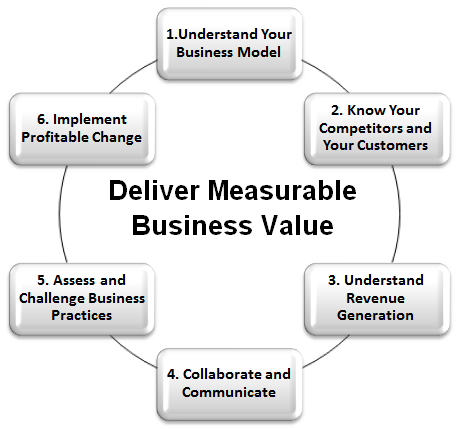 The BABOK® Guide version 2 was published in 2009 by the IIBA® (International Institute of Business Analysis) and defined our discipline. It brought much needed structure to our work and helped communicate what we do. Fast-forward to 2014; our discipline is 5 years older and 5 years wiser. What are leading BAs doing and where do we see the business analysis profession heading?
The BABOK® Guide version 2 was published in 2009 by the IIBA® (International Institute of Business Analysis) and defined our discipline. It brought much needed structure to our work and helped communicate what we do. Fast-forward to 2014; our discipline is 5 years older and 5 years wiser. What are leading BAs doing and where do we see the business analysis profession heading?
The PMI® (Project Management Institute) is introducing a new certification for business analysts – the Professional in Business Analysis (PMI-PBA®). It is too new to determine the impact of this certification on our profession but it is safe to say that its primary goal appears to be to address better requirements management practices within the scope of a project or at a program level. This continues to be a challenging area for organizations with as many as 1/3 of all project failures being attributed to poor requirements management practices.
Additionally, BABOK version 3 is on its way. It’s currently going through the public review process which will conclude in July. I think we’re looking at official publication later in 2014. When you review it, the thing you’ll notice right away is the expanded and higher valued definition of Business Analysis. The focus is considerably different than version 2. Now Business Analysis is the practice of enabling change. In other words it’s about helping your organization achieve strategic goals, taking it from where it is today to where it wants to be in the future.
It’s about helping your organization articulate business needs and it’s about recommending solutions. Now there’s an equal focus on not just understanding requirements but also helping develop solutions. And importantly, it’s about delivering value. Along with the more strategic definition of our discipline there is a new model describing what we do.
BABOK v3 introduces the Business Analysis Core Concept ModelTM. This describes 6 key concepts that we must understand: Needs, Changes, Solutions, Contexts, Value, and Stakeholders. Plus it describes the relationships between those 6 concepts.
This introduces a very dynamic model with highly interconnected elements and I think the model is much more representative of what we BAs should be doing. Which is a great segue to what I see amongst my clients; here’s where they are headed.
Most importantly leading organizations want their BAs to deliver measurable business value. It’s not just about helping define needs although that’s part of it. It’s not just about requirements although that’s part of it. It really is about understanding how your organization makes money or achieves its mandate and it’s about helping your organization successfully transition to a brighter future.
Leading organizations are not executing projects just for the sake of implementing new technology. They want each and every project to deliver business value and they want to measure that value. For them, BAs are involved at project initiation, throughout the project, during implementation, and beyond. They want BAs to measure the actual value being delivered once the solution is implemented and being used.
With that in mind, here’s what leading organizations need from their BAs:

- You absolutely must understand your organization’s business model. It describes how your organization creates and delivers value. You must understand your customer segments, the channels through which you reach those customers, and the relationships that are established along the way. You must understand your organization’s value proposition delivered to your marketplace, your cost structure for delivering that value and the revenue streams that flow back. You must understand the key people in your organization responsible for delivering results, partnerships forged to help, and the important activities for success.
- You must intimately understand the 2 Cs – Your Competitors and your Customers. Customer knowledge helps you deliver highly valued, relevant products and services and competitor knowledge allows you to stay one step ahead. Who are your primary competitors? Who are the emerging competitors or potential future competitors? How does their business model differ from yours? What makes them an attractive choice in your marketplace? Why would potential customers gravitate towards them?
And as far as your customers are concerned – Why do they buy from you? What keeps them up at night? What problems are they trying to solve that your organization can help with? How are their needs changing?
- You must understand how your organization makes money. Both how it generates revenue and what it takes to turn a profit. What products are offered? What services are offered? What is your pricing strategy? What’s your cost structure? How do these compare to your competitors? How well does your pricing strategy align with customer expectations?
- You must possess highly-developed communication and collaborative skills. Leading organizations are looking for BAs that can bring people together to deliver value. That means BAs must possess highly developed collaboration and communication skills. They engage stakeholders, develop support for a recommended solution, and focus teams on the desired results. They also bring key facilitation skills to promote innovation, encourage creativity, and develop shared understanding.
- You must be able to help your organization fundamentally rethink how it executes business. Leading organizations see their business processes and practices as a source of competitive advantage. They want every project that they initiate to challenge current business practices and redesign processes to deliver measurable improvements in key performance metrics. So they need BAs who are able to quickly understand current business practices and are strong enough to challenge fundamental assumptions about how business is done. BAs need to look past “we’ve always done it that way” and focus people on a better way of doing things
- You must be able to help drive out the benefits as described in the original business case. BAs need to be able to help implement their recommended solutions and go beyond this. Leading organizations realize that a potential solution has no value until its implemented and being used. They want savvy business experts to help ensure solutions are successfully implemented and are delivering measurable business value. Where an implemented solution fails to live up to expectations, they want their BAs to tweak that solution to drive out the benefits envisioned in the original business case.
There you have it; the bar has been raised! Leading organizations are looking for a new kind of BA – a much more strategic BA that can help deliver measurable business value. Are you willing to step up to this role?
Don’t forget to leave your comments below.
Notes
1. BABOK® Guide & IIBA are registered trademarks owned by International Institute of Business Analysis.
2. “PMI” is a registered mark of Project Management Institute, Inc.


 The BABOK® Guide version 2 was published in 2009 by the IIBA® (International Institute of Business Analysis) and defined our discipline. It brought much needed structure to our work and helped communicate what we do. Fast-forward to 2014; our discipline is 5 years older and 5 years wiser. What are leading BAs doing and where do we see the business analysis profession heading?
The BABOK® Guide version 2 was published in 2009 by the IIBA® (International Institute of Business Analysis) and defined our discipline. It brought much needed structure to our work and helped communicate what we do. Fast-forward to 2014; our discipline is 5 years older and 5 years wiser. What are leading BAs doing and where do we see the business analysis profession heading?